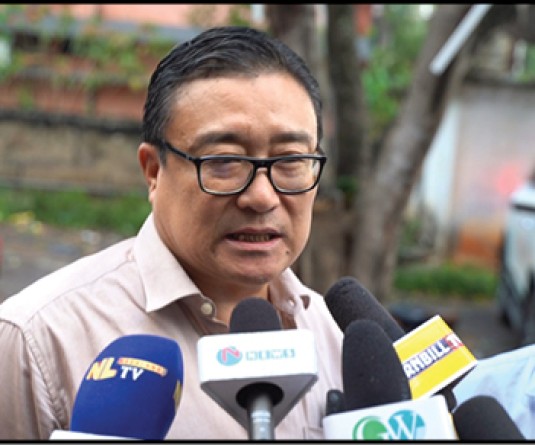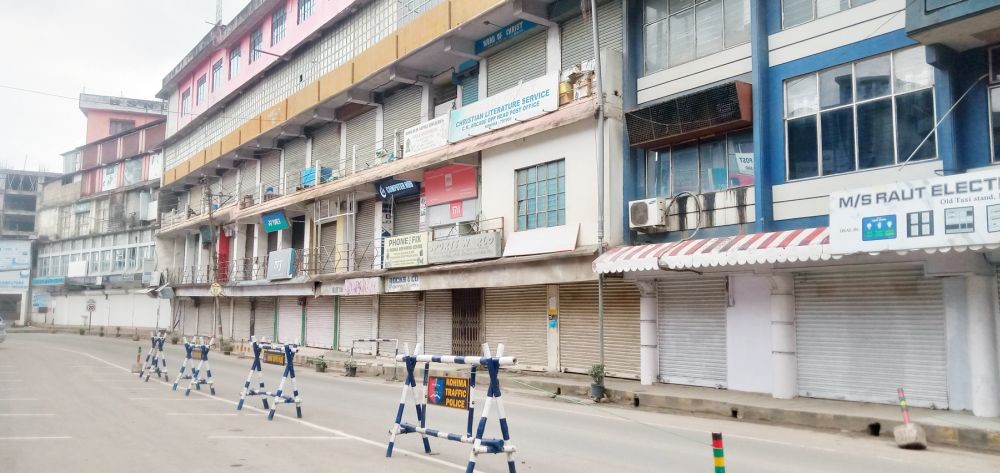
Our Correspondent
Kohima | February 25
The ruling People’s Democratic Alliance (PDA) on Monday adopted a government resolution rejecting the Citizenship (Amendment) Bill (CAB), 2016 following three days of debate on the controversial bill vis-a-vis Article 371 (A) of the Constitution of India and the Bengal Eastern Frontier Regulation (BEFR) Act of 1873.
Although both the treasury and opposition benches strongly opposed the said bill, they could not meet eye-to-eye over the reference of Article 371 (A) and BEFR in the resolution, and the latter staged a walkout for the second time today when Deputy Speaker Zhaleo Rio put the resolution to vote in the House.
While the Leader of the House, Chief Minister Neiphiu Rio consented to the opposition’s move for amendment to replace the word ‘government’ with ‘Nagaland Legislative Assembly’ in the title of the resolution, he refused to omit two clauses which cited Article 371 (A) and BEFR Act saying that the content of the resolution was made on the basis of the decision arrived with the civil society and tribal hohos on January 31 consultative meeting at Chumuokedima on CAB 2016.
Opposition leader TR Zeliang pointed out that CAB has nothing to do with Article 371 (A) and BEFR Act and strappingly asserted that special provisions granted to the state of Nagaland under Article 371 (A) in the Constitution and BEFR should be well protected and held sacred by all Nagas, by using them in appropriate relevance only.
“We should not belittle and let anything infringe on this Article and Act, rather we should endeavor to strengthen them in every possible way. However, the claim of the State Government that the Bill will not be applicable to Nagaland as the State is protected under Article 371 (A) and the BEFR Act, 1873 is wrong. Even the Governor in his Republic Day address on January 26, stated that the Bill is not applicable to Nagaland. Depending entirely on such unproven interpretation and applicability of Law on an important issue, which challenges the very existence of the indigenous people of the State, may not only be undesirable but self-defeating,” Zeliang stated.
He cited several instances where the Article 371A was rendered ineffective and limited by the Union Government of India such as the Nagaland (Ownership and Transfer of Land and its Resources) Act 1990, the 74th Amendment Act (Article 243-T) on 33% women reservation, and Nagaland Petroleum & Natural Gas Rules 2012. These few cases, according to Zeliang, clearly show that the definition of Article 371 (A) is liable to be interpreted according to advantage of the Union Government.
“We cannot be complacent and totally depend on it to safeguard our indigenous status even in the case CAB. When subjects which are clearly within the purview of Article 371 (A) can be superseded by Central Government through other empowered Acts, how can the PDA Government assure the people that Article 371A will protect the Nagas from CAB 2016 without any mention made in the Bill?” he questioned.
Zeliang also emphasized that Assembly resolution cannot go in two ways: “We cannot reject the CAB on one hand and on the other hand mention that we are protected under Article-371 (A) or ILP,” he said while questioning if the PDA believed Nagas are protected under Article 317 (A) then why were they opposing it.
Chief Minister Rio, while sharing his view on CAB, said Article 371 (A) is “very much” related to CAB since it deals with the Naga religious and customary practices. He added that the Article also deals with the entitlement of land and its resources and includes Inner Line Permit notification issued under the Bengal and Eastern Frontier Regulations, 1873, which was included and reiterated as clause 16 of the 16 Point Agreement. He stressed that Article 371 (A) is the very basis of the existence of the state, and it was relevant in matters relating to the CAB as well.
Stating that the ruling bench had tried their best to accommodate the opposition MLAs’ feelings, however the latter had remained adamant on their stand which he felt would jeopardize Nagaland and its people by becoming like any other state, without the protection of Article 371 (A). Once the proposed bill becomes a law, he said even if states say they want to reject, they cannot reject the Parliament law as they have no mechanism.
Earlier in the morning segment of the sitting, the opposition members walked out protesting against Minister for Urban Development for trying to respond to a supplementary question on Rural Development department raised by the opposition.




